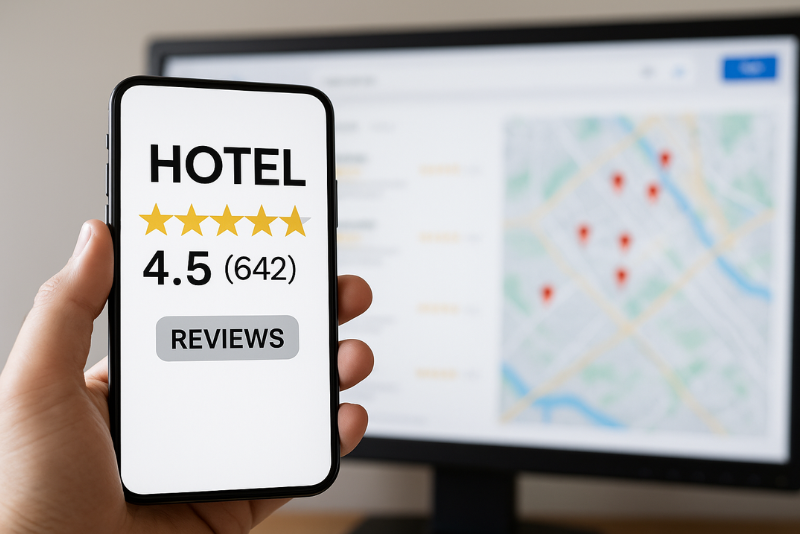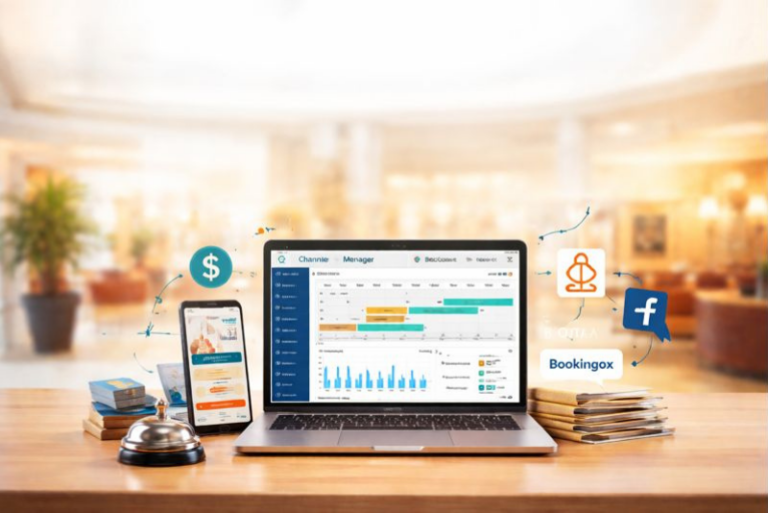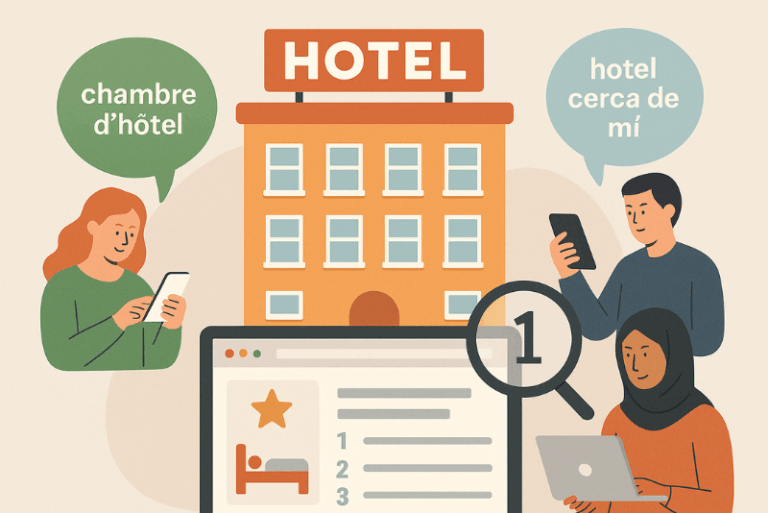How Reviews Impact Hotel Local Search Rankings
Reviews are no longer just about reputation.
They’re a direct signal to Google’s ranking algorithms — and they influence how AI-powered search tools recommend your hotel.
Hotels that aren’t actively managing their reviews risk losing visibility — and bookings — to competitors. Reviews directly impact your hotel’s local visibility and determine how prominently your property appears in search engine results.
The question is how reviews impact hotel local search rankings?
They are crucial for improving a hotel’s visibility and attracting more potential guests.
The good news?
With a few simple steps, you can take your review game to a new level and outperform your competitors. It’s not challenging; it’s about consistency.
Key Takeaways for Hotel Owners
- Hotels appearing in Google’s 3-Pack receive 126% more clicks than those outside it.
- The same review strategy boosts both local SEO and AI search visibility.
- Focus on quantity, quality, and recency of reviews to dominate search results.
- You can start improving in 7 days without hiring outside help.
Why Reviews Matter in Local Hotel SEO

When a traveler searches for “boutique hotel near me” or “best hotels in [city],” Google’s algorithms are making some complex calculations behind the screen.
Reviews play a significant role in determining who gets seen and who gets buried on page 10. They are a key factor in determining search engine rankings for a hotel website, and the closer to the top of the list you can rank, the easier it is to attract bookings.
Google looks at three key review signals:
- Quantity — The total number of reviews your property has compared to competitors.
- Quality — The average star rating, with higher ratings boosting trust.
- Recency — Fresh, up-to-date feedback that shows your hotel is active and relevant.
- Review Frequency: Regularly receiving reviews (not just bursts) signals ongoing customer engagement and helps maintain ranking.
- Review Sentiment: The positivity (sentiment) and descriptive content in reviews matter.
- Responses: Active responses to both positive and negative reviews show engagement.
- Review Keywords: Amenities, location, or services in reviews can boost search visibility.
- Review Platforms Diversity: Multiple authoritative platforms (Google, TripAdvisor, Facebook, Yelp) signal trust.
💡 Stat: A BrightLocal study found that 77% of consumers “always” or “regularly” read reviews when browsing for local businesses — and hotels with 100+ Google reviews are far more likely to appear in the top map pack.
The Google 3-Pack and AI Search Connection

Earning a spot in the 3-Pack — those top three local listings in Google Maps — is the key to more visibility, clicks, and bookings.
But there’s a bonus: AI search tools like Google’s AI Overviews, Bing Chat, and voice assistants often pull from the same review data.
💡 Example: In Google’s AI Overview for “best hotels near the Chicago River,” hotels with highly descriptive reviews mentioning “river view,” “close to attractions,” and “great breakfast” were directly cited in the AI answer box.
Optimizing your reviews for the 3-Pack also increases your chances of being featured in AI-generated answers, giving you a competitive edge in both human and AI-driven search.
While AI search optimization is something new, the fundamentals haven’t changed.
Google’s Perspective: Reviews as Social Proof

Google’s goal is to give searchers the most relevant, trustworthy options.
Positive reviews are social proof — showing potential guests (and Google) that your hotel delivers.
Search engines use advanced techniques, including schema markup, to better understand and rank hotel listings based on review content.
Frequent mentions of specific features like “walking distance to the train station,” “amazing rooftop bar,” or “family-friendly pool” help Google match your listing to niche search queries.
Your goal is to meet your potential customer and show them that you have what they are looking for.
Competitive Review Analysis
To improve your ranking, you need to know where you stand. Compare your review profile against competitors by looking at:
- Average star rating
- Total review count
- Recency of reviews
- Common keywords or phrases in reviews
Conducting keyword research and analyzing booking platforms, review sites, and local directories can reveal additional opportunities to improve your hotel’s local SEO.
Tools like Google Maps, TripAdvisor, and Booking.com can reveal competitor strengths and gaps you can exploit.
💡 Stat: Businesses ranking in the Google 3-Pack have an average of 47% more reviews than those outside of it.
Review Content as Keyword Fuel
Your website isn’t the only place keywords matter. Guest-generated language in reviews can help your listing appear for searches you didn’t even target.
For example, if multiple guests mention “the rooftop bar with the best sunset view in Chicago,” Google can connect your hotel to queries like “hotel with rooftop bar Chicago” — even if you never used that exact phrase on your site.
Encourage specificity by asking guests to share what stood out about their stay. Including local keywords, relevant keywords, and location-based keywords in guest reviews can further improve your hotel’s visibility in local search results.
Review Velocity and Diversity

Google values steady, natural review growth. A consistent trickle of new reviews signals ongoing popularity, while sudden bursts followed by silence can look suspicious.
Diversity matters too — while Google reviews carry the most weight, having strong profiles on TripAdvisor, Yelp, and Booking.com reinforces credibility and broadens your reach. A steady stream of online reviews, especially when you actively encourage guests to leave reviews on multiple platforms, strengthens your hotel’s reputation, boosts guest reviews, and enhances your search visibility.
The Overlooked Factor: Review Response Strategy
Responding to reviews isn’t just good manners — it’s a ranking signal. Google has stated that owner responses can improve local SEO.
Best practices include:
- Reply within 48 hours
- Personalize each response (use the guest’s name and reference their comments)
- Address negatives professionally and constructively
- Use guest feedback to identify areas for improvement and show potential guests that you are responsive
- Thank reviewers for highlighting positives
Turning Reviews into a Ranking Advantage
Practical steps to make reviews work harder for you:
- Ask at the right time — within 24 hours of checkout, when the experience is fresh.
- Automate reminders — use your property management or CRM system.
- Follow platform rules — avoid offering prohibited incentives.
- Showcase reviews — add select review snippets to your website and marketing materials for extra SEO and trust-building.
Showcasing positive reviews on your hotel’s website can increase direct bookings by building trust and streamlining the booking process for potential guests.
Measuring Impact Over Time

Tracking results keeps your strategy sharp. Use Google Analytics to monitor your hotel’s SEO performance, website traffic, and organic traffic—these are key indicators of overall local SEO strategy performance. Monitor these metrics monthly:
- Star rating average
- Number of new reviews
- Search impressions in Google Business Profile.
- Position in the Google 3-Pack
- Keyword mentions in reviews.
Preparing for AI-Driven Search
AI search tools pull review data into summaries and recommendations. Descriptive, specific, and recent reviews are more likely to be surfaced.
AI also pulls from multiple platforms — not just Google — so your presence on secondary sites matters.
Action steps for AI visibility:
- Audit reviews for “descriptive richness”
- Encourage guests to mention standout amenities and experiences.
- Use review responses to reinforce key selling points.
- Use Google Search and Google Search Console to monitor your hotel’s online visibility and performance in local search results.
💡 Stat: Over 50% of Gen Z and Millennials say they trust AI-powered search results as much as — or more than — traditional search results when researching travel.
How-To Guide: Action Plan for Hotel Owners
1. Audit your review profile
- Search your hotel name in Google and note the star rating, review count, and recent reviews.
- Do the same for top competitors.
2. Ensure contact details are accurate
- Make sure your hotel’s contact details are up-to-date and visible on your website and all local listings and directories.
3. Claim and optimize your local business profiles
- Claim and optimize your local business profiles on Google My Business and other platforms to improve your local listing visibility.
4. Create a review request process
- Ask in person at checkout, follow up with email/SMS within 24 hours.
- Keep the request short and personal.
5. Focus on specifics
- In your request, prompt guests to mention amenities, location perks, and service touches they enjoyed.
6. Respond to every review
- Use the guest’s name, reference something they mentioned, and thank them.
- For negatives, apologize where appropriate and offer a path to resolution.
7. Spread reviews across platforms
- Rotate review requests between Google, TripAdvisor, and Booking.com.
8. Track monthly metrics
- Keep a simple spreadsheet of review count, star rating, keyword mentions, and local search results pack position.
9. Leverage reviews in marketing
- Add high-impact quotes to your website, brochures, and social media posts.
Quick Start: 7-Day Plan
Day 1: Audit your review profile and top three competitors.
Day 2: Write your post-stay review request template.
Day 3: Train staff on when/how to ask for reviews.
Day 4: Set up a simple tracking sheet for reviews and rankings.
Day 5: Respond to the 10 most recent reviews on Google.
Day 6: Claim and update profiles on TripAdvisor and Booking.com.
Day 7: Identify three reviews to feature on your website and social channels.
Ready to See Where You Stand?
Take our Hotel Scorecard to assess your current setup in minutes.
Conclusion
Reviews are more than feedback — they’re a marketing engine.
The same review strategy that gets you into Google’s 3-Pack will also position your hotel for visibility in AI-powered search results. Focus on quality, quantity, and recency, and you’ll not only rank higher but also win the trust of travelers before they even visit your site.







